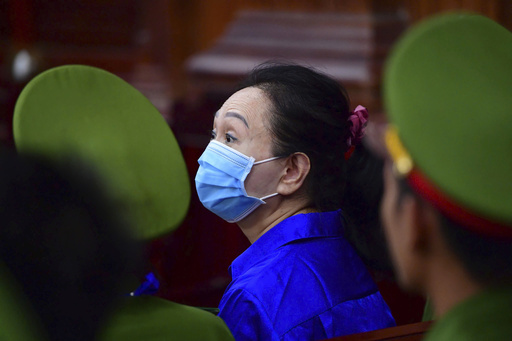The second trial for Vietnamese real estate mogul Truong My Lan, who was previously sentenced to death for financial fraud in April, commenced on Thursday as reported by state media. Lan, aged 67, is the chair of Van Thinh Phat, a prominent real estate company in Vietnam. She was found guilty of masterminding the country’s largest financial fraud case, totaling $12.5 billion, representing nearly 3% of the nation’s 2022 GDP. Additionally, she was charged with illegally exerting control over a major bank, resulting in $27 billion in losses through unauthorized loans.
Lan’s arrest and conviction marked a significant development in Vietnam’s anti-corruption campaign, known as the blazing furnace initiative, which has targeted high-ranking officials since 2022. The case has had repercussions in the upper echelons of Vietnamese politics, prompting the resignation of a former president linked to the corruption scandal. In the ongoing trial, Lan faces new allegations of fraudulent appropriation of property and money laundering. Authorities reported that she raised $1.2 billion from approximately 36,000 investors by illicitly issuing bonds through four companies.
A police investigation revealed that Lan’s Van Thinh Phat controlled 21 companies that unlawfully transferred over $4.5 billion in and out of Vietnam between 2012 and 2022. Moreover, she is accused of embezzling $18 billion acquired through fraudulent activities. The case involves a total of 33 defendants and is anticipated to last for a month. Lan and her family established Van Thinh Phat in 1992 following Vietnam’s transition to a more market-oriented economy open to foreign investors. Initially involved in selling cosmetics with her Chinese entrepreneur mother, Lan’s company grew to become one of the wealthiest real estate firms in Vietnam, engaging in various upscale projects such as luxury residential complexes, offices, hotels, and shopping centers.
The magnitude of Lan’s initial trial had a profound impact on the Vietnamese population, raising concerns about potential misconduct within other financial institutions or businesses. This situation has cast a shadow over Vietnam’s economic prospects and foreign investors’ confidence in the country’s stability, particularly as Vietnam aims to attract businesses seeking to diversify their supply chains away from China.


